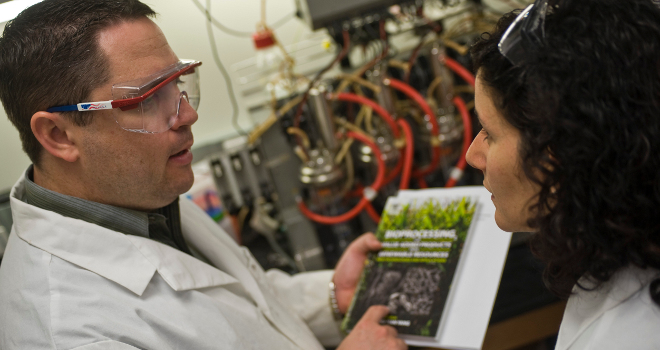By Tina Casey
A research team at Rice University has developed a new strain of E. coli that can create biofuel at a rate that is about ten times faster than other bacteria — and they can do it on a cheap diet of glucose and mineral salts.
The discovery opens the door to a new generation of renewable biofuels that cost less than petroleum based fuels.
Researchers are beginning to focus on bacteria in biofuel production, using natural metabolic pathways to break plant sugars down more efficiently.
By deploying the bacteria’s own energy to push the process forward, they can eliminate several costly, energy intensive steps that are needed in conventional biofuel production.
The Rice team, headed by associate professor Ramon Gonzales, focused on tweaking the metabolic pathway of E. coli. Short for Escherichia coli, the bug is better known as a common source of food poisoning.
In conventional bacteria-biofuel research, the emphasis is on enhancing the part of the metabolic process that builds fatty acids. The Rice team deployed a sort of reverse psychology, and went to work on the process by which E. coli breaks fatty acids apart.
“It’s definitely unconventional, but it makes sense because the routes nature has selected to build fatty acids are very inefficient compared with the reversal of the route it uses to break them apart,” Gonzales explained in a recent article from Rice.
The Rice team showed that about a dozen genes can be manipulated to make the process yield different kinds of fatty acids. Called beta oxidation, the process is practically universal among living organisms, so E. coli is just one among many potential feedstocks for new biofuels that could be enhanced by this kind of manipulation. Emerging biofuel sources such as algae and yeast are two promising examples cited by Gonzales.
The Rice team’s bacteria-based process can yield butanol, which gives it a major advantage over first-generation biofuels such as corn ethanol. Unlike ethanol, butanol is a drop-in fuel that can substitute directly for gasoline.
In a similar line of research, earlier this spring a team at the federal Oak Ridge laboratory in Tennessee announced the development of a strain of bacteria that can produce another drop-in gasoline replacement, isobutanol, grown on an inexpensive diet of woody biomass including agricultural waste like corn stover.
If the Rice team’s high-efficiency E. coli proves itself in commercial operation, it would allay some concerns regarding the long term sustainability of large scale biofuel production. The University of Virginia, for example, has just released a study indicating that the conventional production method for algae biofuel requires a relatively high amount of input from petroleum fuels along with a copious amount of water, and it emits more greenhouse gases than biofuels made from switchgrass and other land-grown plants.
Bacteria could also offer the biofuel industry a way out of the glycerol swamp it has created. Crude glycerol is the slimy, gooey, hard-to-dispose-of byproduct of the biofuel process, and hundreds of millions of gallons are glutting the world market. A researcher at the University of Alabama is developing a strain of Clostidium pasteurianum bacteria that could produce butanol from glycerol – just for starters. The same process could yield two other types of biofuels as well as acetic acid and butyric acid, a pungent substance that can be used in everything from perfumes to fish bait and animal feed.









